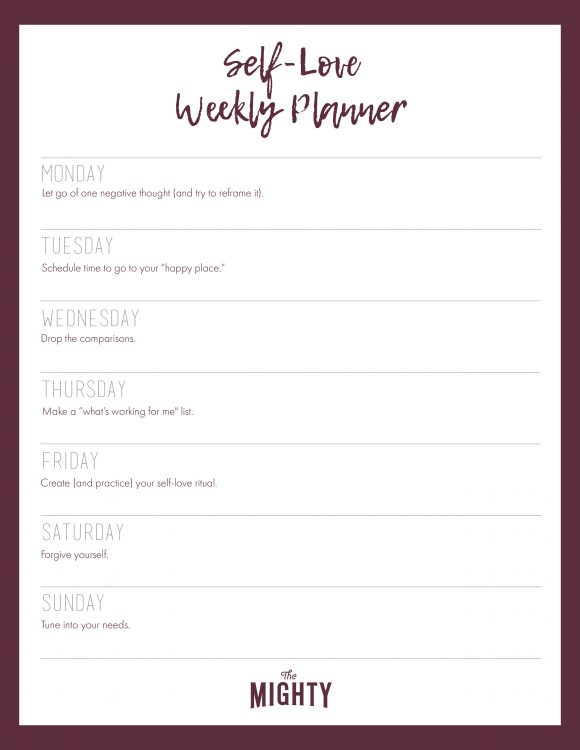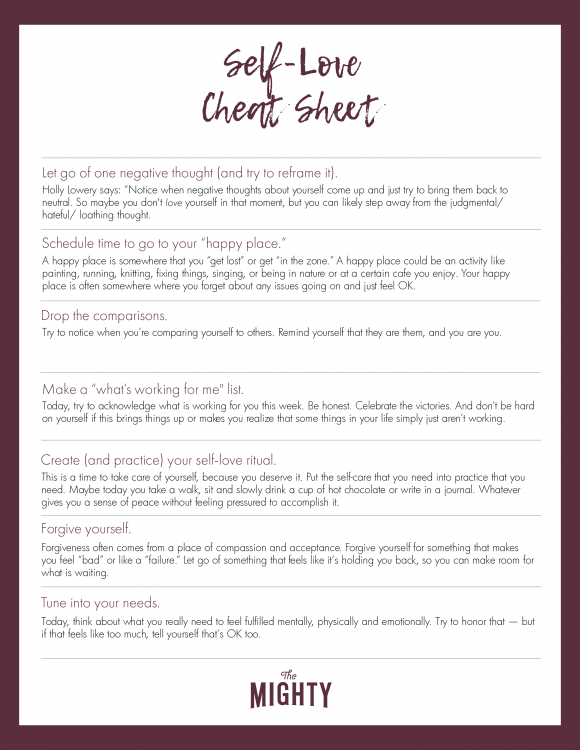For some of us, February, the month that gives us Valentine’s day, is about celebrating those we love. As easy as it may be to recognize why we love others — whether that be a friend, family member or someone in our support system — recognizing why we love ourselves can be difficult, especially when you’re struggling with mental or physical illness.
While managing an illness can make it hard to take care of yourself, it can also make it difficult to find compassion toward a body or mind that feels somehow “defective” or “broken,” Annie Wright, MFT, told The Mighty. Struggling to love yourself isn’t uncommon, and can be difficult if you grew up in an environment that wasn’t loving, safe and supportive. Even if you grew up in a loving, functional household, popular culture, the media and the world around us have ways of suggesting we are not enough or that we should be different.
That is why February’s My Mighty Month challenge is about increasing self-love. When we think of the reasons why we love others, it’s rarely because of how much money they make, what job they have, the grades they got, their physical abilities or what they look like. We all deserve to treat ourselves with the same love and kindness we afford others.
Self-love doesn’t happen overnight, which is why we’re giving you seven prompts — one for each day — to repeat throughout February. Our prompts focus on checking in with your mind, body and spirit; being mindful; tuning into your emotions and self-talk. Make note of how you feel and what is going on in your life that week — it can help you adjust your sails if you feel you need to change direction.


Download and print the self-love planner here. Download and print the self-love cheat sheet here.
If you want to change your perspective, it’s going to take practice. “It’s about not punishing ourselves for not being what we think we should be, but instead, learning how to develop an inner-coach rather than an inner-critic,” Susan Pasco, Ph.D., LCSW-R, associate director of Syracuse University’s counseling center and sexual and relationship violence response coordinator, said.
Loving yourself doesn’t have to mean boosting your self-esteem, either. Pasco noted that self-love and self-esteem aren’t one in the same. Self-esteem is often how we view ourselves in relation to others, whereas self-love is about beginning to find acceptance and respect for yourself in every moment — the good and the bad. But the two can sometimes be reflective of one another.
If you can’t envision loving yourself, you can “work toward self-neutrality,” recovery coach and anti-diet advocate, Holly Lowery, explained. “[This] can bring you closer to self-acceptance, and maybe, one day, total self-love.”
For Lowery, self-love means being gentle on herself when she doesn’t accomplish as much as she sets out to or when things feel like they’re spiraling. It means choosing to take care of herself and knowing that those acts of care will look different depending on her needs. It means being OK with the fact that her needs are not static, and never will be.
You can decide what form of self-care works best for you. On a bad health day, bathing or getting out of bed may be too draining and eating and exercise, just chores you’re begrudgingly trying to complete. “One can engage in self-care without self-love,” Pasco said. Meaning, we can attend to our physical needs without being tuned into our emotional ones, and vice versa. But self-care activities can be inherently self-loving when we check in with ourselves to truly determine what we need — mentally, physically and emotionally. Especially in those moments when loving ourselves feels toughest.
Self-love isn’t about pushing ourselves to be perfect. “It’s more like a quiet, steady regard for yourself that allows you to mostly care for yourself, form healthy relationships and set good boundaries as you move through the world,” Wright said. It’s about finding unconditional regard and acceptance for yourself and treating yourself with compassion and respect.
Most importantly, self-love is being patient with yourself. Changes may not happen overnight or even this month. But small steps over a long period of time can make a difference.
Want to make February a Mighty Month? Join us on Facebook at My Mighty Month, and don’t forget to tag any social media posts with #MyMightyMonth. You can also sign up for our My Mighty Month emails, (select “Mighty Monthly Challenges” from the newsletter options), which include tips and reminders designed to keep you motivated.

